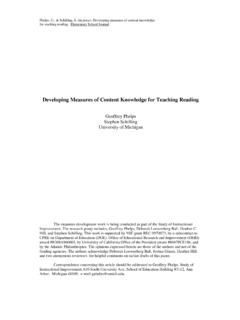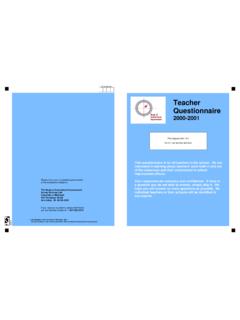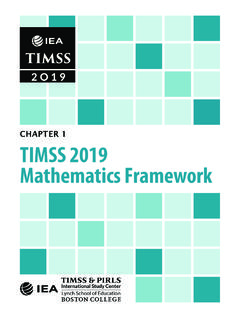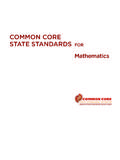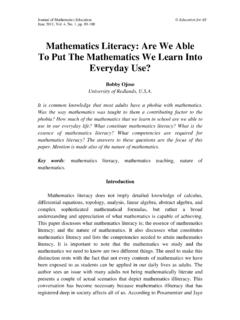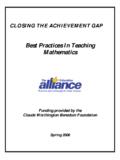Transcription of Effects of Teachers' Mathematical Knowledge for …
1 Effects of teachers Mathematical Knowledge on student achievement 1 Effects of Teachers' Mathematical Knowledge for teaching on Student Achievement Heather C. Hill Brian Rowan Deborah Loewenberg Ball In press at American Educational Research Journal. Heather C. Hill is an Assistant Research Scientist at the School of Education, 610 E. University #1600, University of Michigan, Ann Arbor, MI, 48109; email Her areas of specialization include educational policy, instruction, and teachers content Knowledge .
2 Brian Rowan holds the Burke A. Hinsdale Collegiate Professorship in Education at the School of Education, 610 E. University areas of specialization lie at the intersection of organization theory and school effectiveness research. Deborah Loewenberg Ball holds the William H. Payne Collegiate Professor in Education at the School of Education, 610 E. University #1600, University of Michigan, Ann Arbor, MI, 48109; email Her areas of specialization include the study of efforts to improve teaching through policy, reform initiatives, and teacher education.
3 Effects of teachers Mathematical Knowledge on student achievement 2 Abstract This study explored whether and how teachers Mathematical Knowledge for teaching contributes to gains in students mathematics achievement. We used linear mixed model methodology in which first (n=1190) and third (n=1773) graders Mathematical achievement gains over a year were nested within teachers (n=334 and n=365), who in turn were nested within schools (n=115). We found teachers Mathematical Knowledge was significantly related to student achievement gains in both first and third grades, controlling for key student and teacher -level covariates.
4 While this result is consonant with findings from the educational production function literature, our result was obtained using a measure of the specialized Mathematical Knowledge and skills used in teaching mathematics. This result provides support for policy initiatives designed to improve students mathematics achievement by improving teachers Mathematical Knowledge . KEYWORDS: educational policy; mathematics; student achievement; teacher Knowledge Effects of teachers Mathematical Knowledge on student achievement 3 In recent years, teachers Knowledge of the subject matter they teach has attracted increasing attention from policymakers.
5 To provide students with highly qualified teachers, No Child Left Behind requires teachers to demonstrate subject-matter competency through subject matter majors, certification, or other means. Programs such as California s Professional Development Institutes and the National Science Foundation s Math-Science Partnerships are aimed at providing content-focused professional development intended to improve teachers content Knowledge . This focus on subject matter Knowledge has arisen, at least in part, because of evidence suggesting that teachers lack essential Knowledge for teaching mathematics ( , Ball 1990; Ma 1999), and because evidence from the educational production function literature suggests that teachers intellectual resources significantly affect student learning.
6 Despite this widespread interest and concern, what counts as subject matter Knowledge for teaching and how it relates to student achievement has remained inadequately specified in past research. A closer look at the educational production function literature, for example, reveals that researchers working in this tradition have typically measured teachers Knowledge using proxy variables, such as courses taken, degrees attained, or results from basic skills tests. This stands in sharp contrast to another group of education scholars who have begun to conceptualize teachers Knowledge for teaching differently, arguing that teacher Effects on student achievement are driven by teachers ability to understand and use subject matter Knowledge to carry out the tasks of teaching (Ball 1990; Shulman, 1986; Wilson, Shulman, Richert & 1987).
7 In this view, Mathematical Knowledge for teaching goes beyond that captured in measures of mathematics courses taken or basic Mathematical skills. For example, teachers of Effects of teachers Mathematical Knowledge on student achievement 4mathematics not only need to calculate correctly, but also know how to use pictures or diagrams to represent mathematics concepts and procedures to students, provide students with explanations for common rules and Mathematical procedures, and analyze students solutions and explanations.
8 By inadequately measuring teachers Knowledge , existing educational production function research could be limited in its conclusions, not only about the magnitude of Effects that teachers Knowledge has on student learning, but also about the kinds of teacher Knowledge that matter most in producing student As we discuss below, only a few educational production function studies have measured teachers Mathematical Knowledge directly and used this as a predictor of student achievement (Harbison & Hanushek, 1992; Mullens, Murnane & Willett, 1996; Rowan, Chiang & Miller, 1997).
9 Most other production function studies used tests of teacher verbal ability to predict achievement outcomes. As a result, despite conventional wisdom that elementary teachers subject matter Knowledge influences student achievement, no large-scale studies have demonstrated this empirically (Wayne & Youngs, 2003). Nor is the situation ameliorated by examining process-product research on teaching , in which both the measurement of subject-specific teaching behaviors and the direct measurement of teachers subject matter Knowledge were notably absent.
10 To remedy this situation, this study analyzes teachers scores on a measure of Mathematical Knowledge for teaching . By Mathematical Knowledge for teaching , we mean the Mathematical Knowledge used to carry out the work of teaching mathematics. Examples of this work of teaching include explaining terms and concepts to students, interpreting students statements and solutions, judging and correcting textbook treatments of particular topics, using representations accurately in the classroom, and Effects of teachers Mathematical Knowledge on student achievement 5providing students with examples of Mathematical concepts, algorithms, or proofs.
